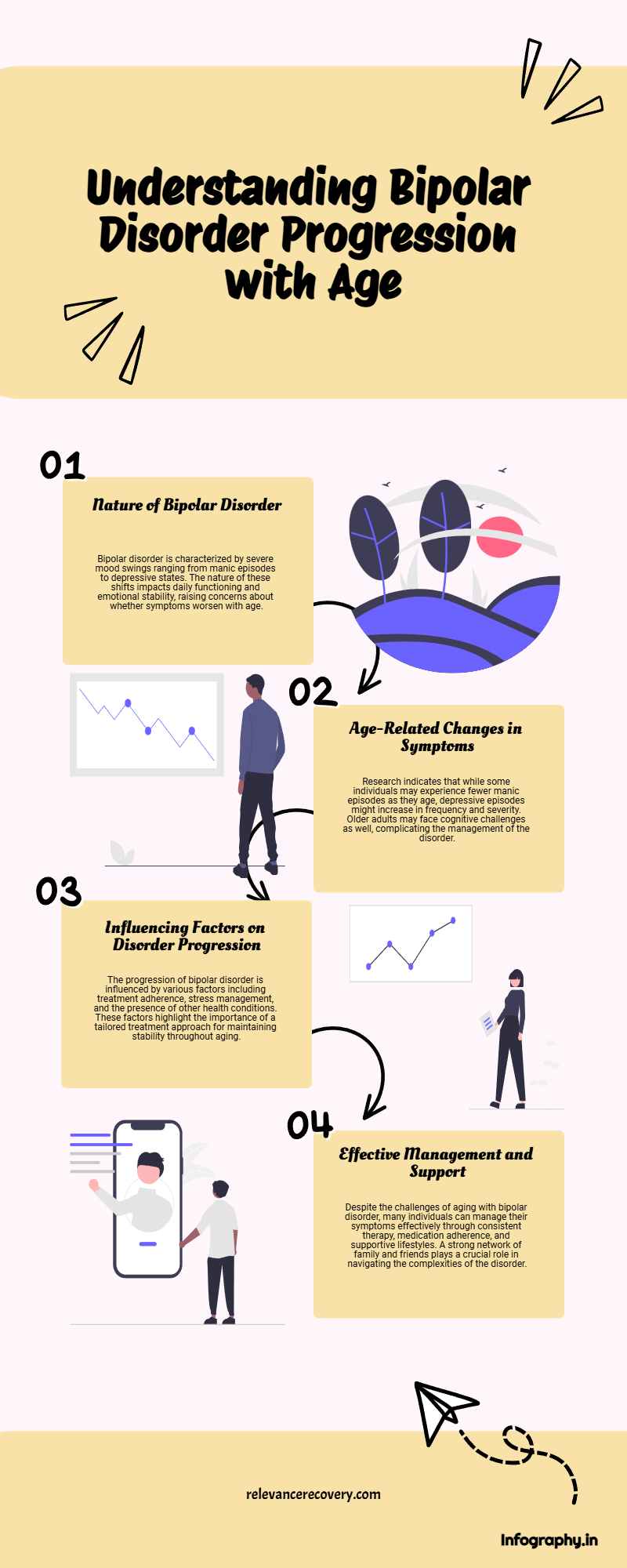Imagine waking up every day not knowing how you’ll feel—whether you’ll be full of energy, capable of conquering the world, or completely drained, unable to move. This is the reality for those living with bipolar disorder. The constant shift between extremes can make life feel unpredictable and overwhelming. And as time passes, one of the most pressing questions often arises: does bipolar get worse with age?
For many, this question comes with a sense of fear and uncertainty. Will the symptoms intensify? Will the ability to cope with them diminish? The truth is that while bipolar disorder can change over time, there are ways to manage it and lead a fulfilling life. In this blog, we’ll dive into the long-term impact of bipolar disorder, exploring how it evolves with age and offering insights on how to face the challenges ahead. No matter what, there’s always hope for growth, stability, and understanding—because you are not alone on this journey.
Bipolar disorder is a mental health condition that causes extreme shifts in mood, energy, and activity levels. These shifts can range from manic or hypomanic episodes—where a person feels overly energetic, euphoric, or irritable, to depressive episodes, where they feel hopeless, drained, or unable to function.
Studies indicate that approximately 5-10% of new bipolar disorder diagnoses occur in adults over 50, sometimes referred to as ‘late-onset bipolar disorder.’
As time goes on, those living with bipolar disorder often wonder if the condition will worsen as they age. While does bipolar get worse with age, it is a common concern. Research shows that the progression of bipolar disorder is complex and unique to each individual.
It’s a question many living with bipolar disorder ask: does bipolar get worse with age? While the symptoms of bipolar disorder can change over time, it doesn’t necessarily mean they will worsen. In some cases, people experience a reduction in the intensity of symptoms as they grow older. However, others may face more frequent or severe episodes.

Several factors can influence whether bipolar disorder worsens with age, including:
The question of does bipolar get worse with age doesn’t have a straightforward answer because it depends on a combination of these factors.
Research shows that as people age, the frequency of manic episodes often decreases, but depressive episodes may become more prominent. This shift could lead to a more challenging experience of bipolar disorder as individuals age.
Although does bipolar get worse with age, the course of the disorder is unique to each person. The combination of age-related changes, the intensity of episodes, and overall health can determine how the disorder evolves.
As you age, living with bipolar disorder might require more adjustments, but it’s possible to thrive. Many people find that with the right support, they can lead fulfilling lives, even as they deal with the challenges of bipolar disorder. So, does bipolar get worse with age? It’s possible, but it’s also possible to live well with it.
Here are some key factors that can improve life with bipolar disorder:
Even if bipolar disorder gets worse with age, these steps can help manage symptoms and improve quality of life.
While it’s true that some people experience more severe symptoms over time, many individuals successfully manage bipolar disorder well into older age. The question of does bipolar get worse with age isn’t always about worsening—it’s about finding strategies to deal with the changes.
Population-based surveys reveal a decrease in the prevalence of bipolar disorder with age, with rates from 1.4% in the young adult population to 0.1–0.5% among older adults.
Ongoing treatment, lifestyle changes, and seeking support can lead to stability. Many people report that with the right care, they feel more in control as they age, despite the challenges bipolar disorder presents.
As a person with bipolar disorder ages, having a strong support system becomes even more important. Family members, friends, and support groups play a vital role in helping manage the challenges that come with aging and bipolar disorder.
Support systems help individuals stay on track with treatment, provide emotional support during tough times, and encourage a positive outlook. For those wondering, does bipolar get worse with age? The answer often lies in the strength of the support network around them.
So, does bipolar get worse with age? The answer is complex and varies for each person. While some experience more challenging symptoms over time, others find that they can manage the condition better as they grow older, especially with proper treatment and support.
Living with bipolar disorder is a lifelong journey, and while there may be difficult times ahead, you don’t have to face them alone. If you’re struggling with bipolar disorder and wondering how to navigate the future, reaching out for professional help is a critical step toward a more stable and fulfilling life. Relevance Recovery offers comprehensive support for individuals facing bipolar disorder, guiding them toward stability, wellness, and a better future.
A: Bipolar disorder tends to worsen with age if not properly managed, especially if there are frequent mood episodes. Symptoms may become more challenging in middle to late adulthood, with a shift from manic to depressive episodes.
A: Untreated bipolar disorder can reduce life expectancy by up to 9 years. Increased risks of suicide, substance abuse, and other health complications contribute to this shorter life expectancy, emphasizing the importance of early diagnosis and treatment.
A: It depends on the individual’s circumstances. For some, living alone may contribute to isolation, while others may find it beneficial. A supportive environment with therapy, family, or close friends is often crucial to managing bipolar disorder effectively.
A: A person with bipolar disorder may experience intense emotions that fluctuate between euphoria and irritability. These mood swings can affect their communication, decision-making, and overall relationships. Stability through treatment and understanding from loved ones is essential.